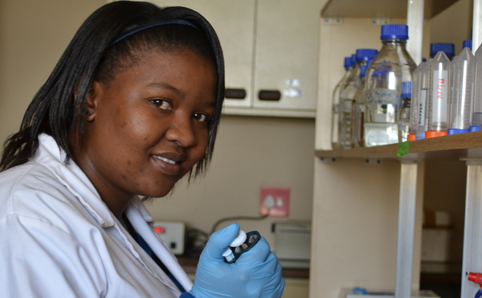|

|
|
Khethiwe Mtshali
|
Khethiwe Mtshali is a classic example of a go-getter. This hard-working 23-year-old student from Ladysmith, who is currently studying at our Qwaqwa Campus, strongly believes in her own abilities. She believes that hard work pays off and that a person will be richly rewarded if you give it your best. Khethiwe has recently returned from a month-long visit to China where she was stationed at the Fresh Water Fisheries Research Centre of the Chinese Academy of Fishery Sciences in Wuxi City.
“I was nominated to go to China to learn and conduct research, as South Africa lacks expertise in the field of food security and related fields of science,” says Khethiwe, a 2011 recipient of the Golden Key Award and an M.Sc.in Zoology student who specialises in Parasitology.
“The Chinese is a hard-working nation that I wish we could emulate as South Africans. Doing my research on parasitology of fish and other related agricultural diseases over there was a worthwhile experience that will not only benefit me as an individual, but the entire Parasitology Division of the Department of Zoology and Entomology at the Qwaqwa Campus. This research is surely going to put the university and the entire country in a better position to compete with the best in the field of parasitology,” Khethiwe said.
After completing her B.Sc. degree in 2008, Khethiwe worked as a teacher at Ezakheni High School for a year before she was summoned back to our university by her mentor and Head of the Department of Zoology and Entomology, Dr Oriel Thekisoe, where she studied towards an honours degree, which she passed with distinction last year.
“If it had not been for Dr Thekisoe, I think I would still be a teacher whose potential would not have been tapped to the maximum. I wish to thank him for pushing me to do my best at all times. He has taught me that where there’s a will, there’s a way,” Khethiwe said.
The best is yet to come for this proud Kovsie who can teach you a thing or two in Chinese!